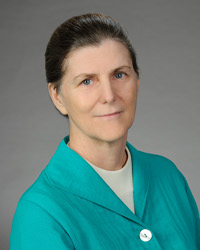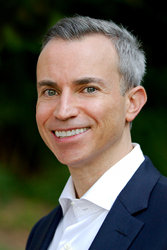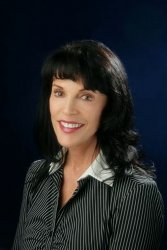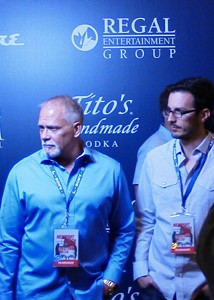Posted by Elena del Valle on July 31, 2017

Teresa Ghilarducci, author, How To Retire With Enough Money
Photo: Matt Furman
A podcast interview with Teresa Ghilarducci, author, How To Retire With Enough Money: And How To Know What Enough Is is available in the Podcast Section of Hispanic Marketing & Public Relations, HispanicMPR.com. During the podcast, she discusses her book with Elena del Valle, host of the HispanicMPR.com podcast.
Teresa is an expert on retirement, pensions, and personal savings, and the Bernard L. and Irene Schwartz Chair in Economic Policy Analysis at The New School for Social Research. She has a Ph.D. in economics from the University of California, Berkeley and taught previously at the University of Notre Dame. Visit Teresa on the web at teresaghilarducci.org and on Twitter: @tghilarducci
To listen to the interview, click on the play button below, scroll down until you see “Podcast” on the right hand side, then select “HMPR Teresa Ghilarducci” and click on the play button below or download the MP3 file to your iPod or MP3 player to listen on the go, in your car or at home from the RSS feed. Some software will not allow flash, which may be necessary for the play button and podcast player. If that is your case, you will need to download the file to play it. To download it, click on the arrow of the recording you wish to copy and save it to disk. The podcast will remain listed in the July 2017 section of the podcast archive.
Posted by Elena del Valle on July 26, 2017

From Indivisible
Photo, video: Fuse, Kudzu Films
In February 2013, Hilary Linder began work on a project that would lead her to the making of her first film, Indivisible, in which she followed the lives of three undocumented immigrants for almost three years. The 78-minute documentary about three undocumented immigrants, screened in 25 film festivals already, will air on Fuse, a cable network, at 10 p.m. ET July 29, 2017. Scroll down to watch a trailer.

Renata, Evelyn and Antonio meet their relatives at the United States-Mexico border
“Renata, Evelyn, and Antonio were young children when their parents brought them to the U.S. in search of a better life; they were teenagers when their families were deported,” Linder said by email when asked to describe the film. “Today, they are known as Dreamers. Indivisible takes place at a pivotal moment in their lives, as they fight for a pathway to citizenship and a chance to be reunited with their loved ones.”
When asked about the goal of the film, she said: “I selected immigration reform as the focus of my first film because I believe it will shape the identity of the United States for generations to come and because I knew there was an incredible human story to tell. When Congress introduced a comprehensive immigration reform bill in 2013, I grew frustrated that media coverage was focusing on numbers and statistics rather than the actual people at the heart of the debate. Knowing that immigration reform is a highly politicized topic, I set out to make a film that would humanize the issue and that both undocumented and documented audiences could relate to—a film about families.”
In the United States she filmed in Massachusetts, New York City, Florida, and Arizona. Overseas, she filmed in Colombia, Brazil, and Mexico.
The documentary, funded mainly by the filmmaker with $30,000 of support she fundraised online and in person, premiered at the Cinequest Film Festival in March 2016.
”
The most common reaction is that they had no idea that families were being separated by deportation or what it is like for families to be separated, and, now that they know, they want to do something to change our immigration system and prevent this from happening,” Linder said when asked about people’s reaction to the film. “Before the election, many people indicated that the film had changed their mind about who they would vote for. And today, at such a scary time for immigrants in the U.S., audiences overwhelmingly ask what they can do to help. We like to direct people to our Take Action page on our website (indivisiblefilm.com/takeaction), where they can sign petitions, receive information about contacting their Members of Congress, and sign up to host their own screening of Indivisible.”
Posted by Elena del Valle on July 20, 2017

The New Health Rules
Photos: Artisan, Timothy White, Brad Hamilton
As our country’s population ages and the average age nears 80 many in their golden years are concerned about quality of life. Young and old are taking account of their health habits, seeking to live not just longer, but healthier lives. At the same time, there is so much conflicting health and nutrition information floating around it is challenging to know what to believe. Toward that end an integrative medicine doctor and a writer teamed up to share their ideas about wellness in a book that strives to provide short and easy to read health rules.
For people who want a minimum of reading they provide short descriptions, many single paragraphs, without ambiguity paired with full page color photos. Each one stands alone in The New Health Rules Simple Changes to Achieve Whole-Body Wellness (Artisan, $14.95), a 224-page softcover book by Frank Lipman, M.D. and Danielle Claro published in 2014.
The book, a New York Times bestseller, is divided into six sections: Introduction, Eating, Moving, Boosting, Healing and Living. The authors were unavailable to reply to questions submitted by email more than two weeks in advance to the book’s publishing company.

Frank Lipman, M.D., co-author, The New Health Rules
In the book, the authors discuss a wide range of wellness topics. For example, in the Living section they recommend readers make sure to drink clean water (they explain that the substances added to tap water such as chlorine and fluoride are bad for the hormonal system). Other recommendations include meditation; walking outside instead of on a treadmill whenever possible; eating grass fed beef, if you eat beef; eating real food (plant foods that require refrigeration); and eating gluten free (most people are mildly sensitive and some highly sensitive, the authors say) non packaged foods.

Danielle Claro, co-author, The New Health Rules
Lipman, according to his biography, is physician to many celebrities such as Kevin Bacon, Kyra Sedgwick, Donna Karan, Jake Gyllenhaal, Maggie Gyllenhaal among others. He is also an international speaker on health and wellness. Claro, deputy editor, Real Simple, is a writer, former professional dancer and yogi. She has written two New York Times bestsellers and launched an indie lifestyle magazine, according to her biography.

Click to buy The New Health Rules
Posted by Elena del Valle on July 10, 2017

HeatherAsh Amara, author, Warrior Goddess Training
Photo: HeatherAsh Amara
A podcast interview with HeatherAsh Amara, author, Warrior Goddess Training is available in the Podcast Section of Hispanic Marketing & Public Relations, HispanicMPR.com. During the podcast, she discusses applying warrior goddess principles to your personal and business life with Elena del Valle, host of the HispanicMPR.com podcast.
A leader in mindfulness, empowerment and shamanism, HeatherAsh is also the author of The Toltec Path to Transformation, Embracing the Four Elements of Change. The heart of her teachings stems from her long Toltec apprenticeship and teaching partnership with Miguel Ruiz, author, The Four Agreements. Over the past fifteen years she has taught workshops and apprenticeships and trained teachers. She now travels the world working with women to integrate the feminine wisdom of the ancients into their modern lives.
To listen to the interview, click on the play button below, scroll down until you see “Podcast” on the right hand side, then select “HMPR HeatherAsh Amara” and click on the play button below or download the MP3 file to your iPod or MP3 player to listen on the go, in your car or at home from the RSS feed. Some software will not allow flash, which may be necessary for the play button and podcast player. If that is your case, you will need to download the file to play it. To download it, click on the arrow of the recording you wish to copy and save it to disk. The podcast will remain listed in the July 2017 section of the podcast archive.
Posted by Elena del Valle on June 29, 2017

Monetizing Your Data
Photos: Andrew Roman Wells, Kathy Williams Chiang
The more advanced our technology becomes the more data managers can gather and store. But once they have it what can they do with it? What should they do to gain an advantage for their business and how should they do it? Managers wondering what to do with all the data their company gathers on customers and prospective customers may be interested in a new book that addresses many data use related questions, Monetizing Your Data: A Guide to Turning Data into Profit-Driving Strategies and Solutions (Wiley, $49.95) by analytics specialists Andrew Roman Wells and Kathy Williams Chiang.

Kathy Chiang, author, Monetizing Your Data
“The target audience for the book primarily includes entry-level to mid-level managers in medium to large sized businesses working in the areas of business analysis, marketing analytics, data science, business intelligence, strategy and business planning,” the authors replied by email via their publishing company when asked about potential readers.
The 344-page hardcover book published March of this year was written in an academic style with tables and charts. It is divided into six main sections titled as follows: Introduction, Decision Analysis, Monetization Strategy, Agile Analysis, Enablement, and Case Study. The authors promise a step-by-step process, Decision Architecture Methodology, to monetize data assets. The authors begin with an explanation of the analytical cycle, striving to guide readers through the process of developing practical strategies. They offer templates, checklists, and examples in a companion website, monetizingyourdata.com.
The biggest challenge to writing and publishing their book, which required 18 months from idea to publication, was that, “Because we are both active practitioners in the field, finding quality time to write and collaborate was a big challenge.” They declined to answer a question about the legal and ethical issues related to monetizing data.

Andrew Wells, author, Monetizing Your Data
“Data is the transactional record of the activity of the business,” the authors replied when asked for a definition of data as it relates to their book. “It captures both internal business activity, such as production of products and services, and external activity such as customer orders, reviews, complaints. It can come in many different forms such as a number, a date, a word, a paragraph, a recorded message, or even an entire document.”
When asked if the data they refer to in the book is different from Big Data, they said, “Big Data at this time does not have a consensus definition but the term is generally used to refer to unstructured data such as social media posts and/or highly granular transactional data of the business characterized by large volume, high velocity and broad variety. The data we speak of in the book covers all types of business data from large to small, such as traditional business reporting metrics such as may be found in financial reporting, customer survey data found in market research, and the large volumes of transactional data that can be thought of as Big Data.”
According to his biography, Wells, chief executive officer, Aspirent, a management-consulting firm focused on analytics, has extensive experience building Analytical Solutions. He also has experience as a hands-on consultant. In Silicon Valley, he worked on customer analytics and the use of predictive methods to drive performance for two start-ups. Wells has also held executive roles as director of Business Intelligence at Capital One and consulted for Coca-Cola, IHG, The Home Depot, Capital One, Wells Fargo, HP, Time Warner, Merrill Lynch, and Applied Materials.
Chiang has expertise in guided analytics, analytic data mart development and business planning. Prior to her current position as vice president, Business Insights, Wunderman Data Management, she consulted with Aspirent on numerous analytic projects for several multinational clients including IHG and Coca-Cola. She has worked for Telecommunications Systems of Trinidad and Tobago, Acuity Brands Lighting, BellSouth International and Portman Overseas.

Click to buy Monetizing Your Data
Comments:
Filed Under: Books
Posted by Elena del Valle on June 21, 2017

Yann Guillet, marketing director, Prototypo
Photo: Prototypo
Following a Kickstarter campaign in 2014 that gave the concept worldwide exposure and a following, in October 2015 Yannick Mathey established Prototypo (111, Boulevard de la Croix-Rousse, 69004 Lyon, France, https://www.prototypo.io/, contact@prototypo.io) in Lyon, France. The company offers customers a web application through which graphic designers and type fans may create unique fonts. Prototypo mainly targets graphic designers. Other users include communication agencies, design agencies and marketing and communication departments.
“The web application Prototypo allows graphic designers and type lovers to create unique fonts in a few clicks,” Yann Guillet, marketing director, said by email when asked about the company. “This innovative approach to type design offers users the opportunity to create stronger visual identities thanks to original and exclusive fonts.”
Prototypo employs seven and is available to domestic and international users. A free version of the software offers a limited parameter range and no font export capability. Subscribers pay $15 a month ($1 for the first month) or $99 for an annual plan. According to Guillet, the company has 25,000 users in 130 countries.
“We’ve got three parametric font templates on the application: Prototypo Fell, Prototypo Grotesk and Prototypo Elzevir,” he said. “We’ll add four more by the end of the year (a new one will be out in two weeks). Our users come from over 130 countries, most of them from USA, France, UK, Germany, Spain and Brazil.”
According to their website, their software is compatible with Chrome, Firefox and Opera. It does not support cursive font templates.
Posted by Elena del Valle on June 12, 2017

Lara Pizzorno, author, Your Bones
Photo: Lara Pizzorno
A podcast interview with Lara Pizzorno, author, Your Bones, is available in the Podcast Section of Hispanic Marketing & Public Relations, HispanicMPR.com. During the podcast, she discusses why your bones need strontium with Elena del Valle, host of the HispanicMPR.com podcast.
A member of the American Medical Writers Association for more than 25 years, Lara is the editor of Longevity Medicine Review, and senior medical editor for Salugenecists, Inc., and Integrative Medicine Advisors, LLC. She regularly writes review articles for physicians on issues related to healthy aging for Integrative Medicine: A Clinician’s Journal, covers the breaking research on bone health via video clips and blogs available at AlgaeCal.com, and edits The World’s Healthiest Foods weekly newsletter. A member of the American College of Nutrition, she is a contributing author to the Textbook of Functional Medicine, the Textbook of Natural Medicine, and Integrative Therapies for Depression; co-author of The Encyclopedia of Healing Foods, and lead author of Natural Medicine Instructions for Patients and of Your Bones: How You Can Prevent Osteoporosis & Have Strong Bones for Life, Naturally, first and second editions, which has been translated into German and Polish.
To listen to the interview, click on the play button below, scroll down until you see “Podcast” on the right hand side, then select “HMPR Lara Pizzorno” and click on the play button below or download the MP3 file to your iPod or MP3 player to listen on the go, in your car or at home from the RSS feed. Some software will not allow flash, which may be necessary for the play button and podcast player. If that is your case, you will need to download the file to play it. To download it, click on the arrow of the recording you wish to copy and save it to disk. The podcast will remain listed in the June 2017 section of the podcast archive.
Posted by Elena del Valle on May 25, 2017

The Business of Recovery
Photos, video: The Business of Recovery
It took the filmmakers behind The Business of Recovery (thebusinessofrecovery.com/) four years to complete the 81-minute documentary targeting “The overwhelming number of people who have been affected by addiction…directly or indirectly.” In June of 2016, they released the film to the public via iTunes, Amazon and Google Play. It was recently screened at the Palm Beach Film Festival. Scroll down to watch a trailer of the film.
According to the Center for Disease Control, in 2015 some 88,000 people in the United States died of alcohol abuse and 47,000 died of a drug overdose. Every day 6,300 people seek addiction treatment at 14,000 treatment centers across the nation; and addiction treatment revenue has increased from $9 billion in 1986 to $34 billion in 2016 while drug overdose rates have tripled, according to The Business of Recovery.
Ninety percent of the centers base their treatments on Alcoholics Anonymous Twelve Steps principles despite abysmal rates of recidivism, according to the documentary. A spokesperson for the National Institute on Drug Abuse explains on camera that there is only anecdotal evidence of limited success for Alcoholics Anonymous treatment. At the same time, there are 60,000 sober living homes across the country with little or no regulation.
“Our goal in making The Business of Recovery was to demand the addiction treatment industry change the way addiction is treated in three primary areas: Better educated and medically licensed professionals in charge of addiction treatment, Regulations to protect the patient and align addiction treatment facilities with medical standards, the use of scientifically proven treatments (empirical, not evidence based),” said Greg Horvath, producer of the film, by email.
He and a close friend financed the documentary, which cost less than one million dollars to make. The producers spoke to hundreds of people, interviewed over 60 families, addiction experts, treatment providers, doctors, and scientists from across the United States.

Greg Horvath, producer, and Adam Finberg, director, The Business of Recovery at the Newport Beach Film Festival
“The toughest challenge was assembling the enormous amount of information we gathered and create a film that would help educate people that for as ‘medical’ as the addiction treatment industry sounds and acts, it lacks most if not all of the rigors of science that are applied to medical treatments,” Horvath said when asked about the greatest challenge and biggest reward of the film project. “And it is all but absent of regulations to protect the patient and align addiction treatment facilities with medical standards. The greatest reward has been the ground swell of public support the film has received, and to see some aspects of the industry slowly starting to change.”
When asked what marketing strategies they had used to promote the film he said, “Our strategy was to create public interest in the film thru film festivals and other screenings. The Business of Recovery premiered at the Newport Beach Film Festival to three sold-out audiences and has been screened across the United States (and Canada) to many other sold-out audiences at film festivals, prestigious post-secondary institutions (including Columbia University Medical School in NY, UC Irvine School of Medicine and School of Law in CA, and Spalding University, School of Professional Psychology in KY, to name a few), and many other public and private screenings. As well, it was one of only four films invited to screen at the International Drug Policy Reform Conference in Washington, DC.”
Click to buy The Business of Recovery
Posted by Elena del Valle on May 18, 2017

The Whole Foods Diet
Photos: Whole Foods Market, Grand Central Life & Style
John Mackey, co-founder and chief executive officer, Whole Foods Market joined forces with Alona Pulde, M.D. and Matthew Lederman, M.D., the latter two known for their Forks Over Knives film and books, to publish The Whole Foods Diet The Lifesaving Plan for Health and Longevity (Grand Central Life & Style, $28). The 336-page hardcover book, published this year, features the Whole Foods Market logo on the cover next to Mackey’s name.

Alona Pulde, MD and Matthew Lederman, MD, co-authors, The Whole Foods Diet
The book is divided into three parts and 15 chapters. Following an introduction by Mackey the authors speak mostly (a final chapter also is in Mackey’s voice) with a single voice, starting with an introductory section on diet and health. A second section outlines their ideas about food and their food group preferences. The remaining two chapters are dedicated to a 28-day meal plan. According to a representative from their publisher, the authors were too busy to respond to questions by email.
Although all three are vegan, they believe a diet consisting of 90 percent vegetables is healthy. Their approach to health begins with eight main food groups: Whole grains and starchy vegetables, beans and legumes, berries, other fruit, cruciferous vegetables, leafy greens, nonstarchy vegetables, and nuts and seeds. The authors dedicate an entire chapter to the groups and their beliefs about each. They dedicate another entire chapter to the ethics of being vegan.

John Mackey, co-author, The Whole Foods Diet
Mackey is co-author of Conscious Capitalism. Pulde is a board-certified practitioner of acupuncture and Oriental and family medicine. Lederman is a board-certified internal medicine physician. Pulde and Lederman were featured in Forks Over Knives and co-authored the New York Times bestseller The Forks Over Knives Plan.

Click to buy The Whole Foods Diet
Comments:
Filed Under: Books
Posted by Elena del Valle on May 11, 2017

American Surveillance
Photo: The University of Wisconsin Press
In American Surveillance Intelligence, Privacy, and the Fourth Amendment (University of Wisconsin Press, $44.95) Anthony Gregory explores the competitive interests of the United States government’s desire for unfettered access to information about its citizens and their right to privacy from undue intrusion. He begins by examining the country’s history in that regard all the way to our Founding Fathers. In this era of increasingly effective technological tools and broadening laws that facilitate a growing number of personal data breaches he concludes that the book asks more questions than it answers.
When asked what inspired him to write the book the author replied by email, “For over a decade I researched civil liberties issues for the Independent Institute, and so this book fit into that larger project. I’d been intrigued by surveillance issues since the war on terror began. Even before that I considered foreign relations and such domestic policies as the drug war to have an affinity in consequences invited more exploration.”
The hardcover 263-page book was published in 2016 in collaboration with the Independent Institute. It is written in an academic style divided into an Introduction, a Conclusion, an Epilogue and nine chapters: Reconnoitering the Frontier, 1775-1899; Foreign Influences, 1900-1945; Espionage and Subversion, 1946-1978; Calm Before the Storm, 1979-2000; The Total Information Idea, 2001-2015; Unreasonable Searches; Fourth Amendment Mirage; Enforcement Problems; and The Privacy Question. It also includes copious end notes and references.
“The main goal was to look at the intersecting issues of security intelligence and privacy rights with fresh eyes,” he said. “These are big questions with correspondingly huge literatures, and I wanted to deliver a contribution that made sense of it all, both providing a balanced analytical approach to multiple complex topics and revealing the more radical implications of what many self-described moderates on both sides of policy controversies advocate.
“I hoped it would reach both scholarly specialists and generalists as well as lay audiences concerned about policy,” he said when asked who was the target audience for the book. “It serves to curate a lot of different literatures and so can be a starting point for many different types of readers. Those in policy seeking simple answers might not find them here, but they will find some material that I hope will enhance their understanding.” In response to questions about the greatest challenge the book posed, he said: “I suppose the biggest challenge was maintaining analytical balance, and satisfying peer reviewers with different perspectives while maintaining an editorially sufficient thesis. I was surprised by many little factual discoveries on the way. I was most pleasantly surprised that some of the scholars on privacy and intelligence I had most admired found the work worthwhile!”
When asked if he found that the violation of privacy rights of Americans was justified by the safety concerns, he replied: “I try to keep some distance between my academic writing and my ideological commitments, but it’s not always possible. I think privacy advocates understate how strong the consequentialist case can be against their cause. But my view on the rightness or wrongness government surveillance is not primarily rooted in consequentialism. That’s why I think it’s more of a cultural question—not even a matter of legal rights—when we talk about privacy and surveillance. And once you know where you stand on that, you have to see what kinds of other government powers correspond to the degree of privacy you want. That often kicks the question to foreign policy or law enforcement, where sometimes measures taken do not even achieve the stated goals on their own terms. So this is a rather big question.”
Gregory is the author of The Power of Habeas Corpus in America: From the King’s Prerogative to the War on Terror, winner of the PROSE Book Award for legal studies. He is a fellow of the Independent Institute in Oakland, California.

Click to buy American Surveillance
Comments:
Filed Under: Books































